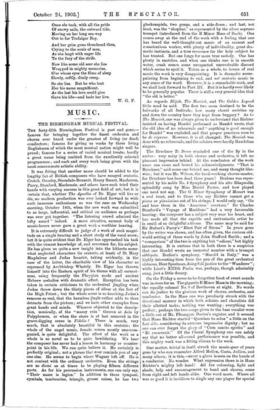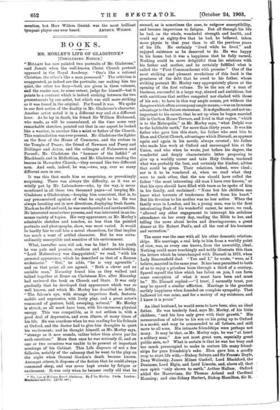M U S IC.
THE BIRMINGHAM MUSICAL FESTIVAL.
THE forty-fifth Birmingham Festival is past and gone,— famous for bringing together the finest orchestra and chorus ever heard under the greatest of living (or dead) conductors ; famous for giving us works by three living Englishmen of which the most musical nation might well be proud; famous for a series of varied musical treats ; hardly a great name being omitted from the excellently selected programmes ; and each and every work being given with the most consummate artistic ability.
It was fitting that another name should be added to the lengthy list of British composers who have essayed oratorio. Crotch, Ouseley, Sterndale-Bennett, Henry Smart, Macfarren, Parry, Stanford, Mackenzie, and others have each tried their bands with varying success in this great field of art; but it is certain that, whether The Apostles of Dr. Elgar will live or die, no modern production was ever looked forward to with such immense enthusiasm as was the case on Wednesday morning, October 14th, when the new work was submitted to as large, influential, and critical an audience as perhaps was ever got together. "The listening crowd admired the lofty sound" indeed. A more attentive, earnest body of music-lovers never gave a great work a worthier hearing.
It is extremely difficult to judge of a work of such magni- tude on a single bearing and a short study of the vocal score; but it is quite evident that Dr. Elgar has approached his task with the utmost knowledge of, and reverence for, his subject. He has given us quite a new insight into the hitherto some- what neglected characters (in oratorio, at least) of St. Mary Magdalene and Judas Iscariot, taking evidently, in the ease of the latter, the charitable view of his character as expressed by Archbishop Whately. Dr. Elgar has thrown himself into the Eastern spirit of his theme with all earnest- ness, using frequently the Phrygian mode and ancient Hebrew melodies with dramatic effect. Exception has been taken in certain criticisms to the orchestral jingling when Judas threw down the thirty pieces of silver at the feet of the High Priest ; but the whole scene is so touching. Judas's remorse so real, that the harmless jingle rather adds to than detracts from the picture ; and we have other examples from great hands and minds. Whoever objected to the descrip- tion, musically, of the "massy ruin" thrown at Acis by Polyphemus, or when the stone is at last removed in the
grave-digging scene in Fidelio There is much, very much, that is absolutely beautiful in this oratorio; the whole of the angel music, female voices mostly unaccom- panied, is quite delightful. The effect of the work as a whole is so novel as to be quite bewildering. We hear the composer has never had a lesson in harmony or counter- point in his life. We can quite believe it. He certainly is perfectly original ; not a phrase that ever reminds you of any one else. He seems to begin where Wagner left off. He is not content with the ordinary orchestra. Even the strings are so divisi as at times to be playing fifteen different parts. As for his percussion instruments, one can only say, " Their name is legion." In addition to three tympani, cymbals, tambourine, triangle, grease caisse, he has two
glockenspiels, two gongs, and a side-drum ; and last, not least, was the " shophar," as represented by the silver soprano trumpet (introduced from the B Minor Mass of Bach). One comes away at the end of the work with a feeling that one has heard the well-thought-out music of an earnest and conscientious worker, with plenty of individuality, great dra- matic instincts, and a true reverence for the holy subject he has treated. But one longs for more true melody. One has plenty in snatches, and when one thinks one is in smooth water, crash comes some unexpected unresolvable discord which seems to spoil it. Taken as a whole, to lovers of real music the work is very disappointing. It is dramatic scene-
painting from beginning to end, and not oratorio music in any sense of the word. However, it is a remarkable work, and we shall look forward to Part III. But it is hardly ever likely to be generally popular. There is still a very general idea that "the old is better."
As regards Elijah, The Messiah, and The Golden Legend little need be said. The first two seem destined to be the
bulwarks of all festivals ; how many choral societies up
and down the country have they kept from beggary ? As to The Messiah, one was always given to understand that Richter
insisted on having Handel performed as Handel wrote, that the old idea of no rehearsals and " anything is good enough for Handel" was exploded, and that proper practices were to
be de rigueur. However, it is all changed; The Messiah was done with no rehearsals, and the soloists were hardly Handelian singers.
The Bruckner Te Deum reminded one of the fly in the amber: very noisy in both chorus and orchestra, it left no
pleasant impression behind. At the conclusion of the work some one came and bowed his acknowledgments. "That is Bruckner," said some one behind me, and many thought like- wise ; but it was Mr. Wilson, the hard-working chortle-master, for Bruckner has been dead three years ! Brahma was repre- sented by his noble No. 4 Symphony and his alto Rhapsodie, splendidly sung by Miss Muriel Foster, and how played one need not say. The G Minor Symphony of Mozart was a real treat, and to those who say Richter cannot get a
piano or pianissimo out of his strings, I would only say, "Go and hear them in the 'Anacreon' overture." Sir Charles Stanford's "Voyage of Maeldune " had a very favourable hearing : the composer has a subject very near his heart, and has made all that the capable and enthusiastic artist he
is could of so delightful a theme. The same may be said for Sir Huberes Parry's "Blest Pair of Sirens." In years gone by the writer was shown, and has often given, the curious old- world setting of these words by John Stafford Smith ; and a "comparison" of the two is anything but "odious," but highly interesting. It is curious that in both there is a suspicion
that one Handel wrote an immortal number with a trumpet obbligato. Berlioes symphony, "Harold in Italy," was a
highly interesting item from the pen of the great orchestral virtuoso, Herr Speelman, doing full justice to the " Wanderer "; while Liszt's XHIth Psalm was, perhaps, though admirably sung, just a little dreary.
On the Friday a never-to-be-forgotten feast of sweet sounds was in store for us. The gigantic B Minor Mass in the morning; the equally colossal No. 9 of Beethoven at night. No words can do justice to the glorious work of chorus, orchestra, and conductor. In the Mass one was peculiarly struck with the devotional manner in which both soloists and choralists did their allotted tasks ; nothing was wanting : everything was perfect ; perhaps the two songs given to the bass vocalist were a little out of Mr. Ffrangeon Davies's register, and it seemed that Hans Richter started " Quoniam tit solus " a little on the fast side, considering its extreme impressive dignity ; but no one can ever forget the glory of "Cum sancto spiritu" and "Et resurrexit." Of the Choral Symphony one can safely say that no better all-round performance was possible, and this mighty work was a fitting climax to the week.
One matter, trivial in itself, struck the music-goer of years gone by who can remember Alfred Mellon, Costa, Jullien, and many others; it is this,—never a glove is seen on the hands of a conductor. No wonder. What expression there is in Hans Richter's mighty left hand ! All the colouring, light and shade, help and encouragement to band and chorus, come from right and left bands alike. One word more. Where all was so good it is invidious to single any one player for special mention, but Herr Willem Geaink was the most brilliant























































 Previous page
Previous page